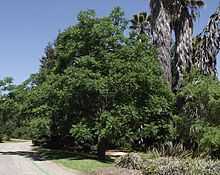Cedrela fissilis
| Cedrela fissilis | |
|---|---|
 | |
| Conservation status | |
| Scientific classification | |
| Kingdom: | Plantae |
| (unranked): | Angiosperms |
| (unranked): | Eudicots |
| (unranked): | Rosids |
| Order: | Sapindales |
| Family: | Meliaceae |
| Genus: | Cedrela |
| Species: | C. fissilis |
| Binomial name | |
| Cedrela fissilis Vell. | |
Cedrela fissilis is a species of plant in the Meliaceae family. It is found in Argentina, Bolivia, Brazil, Colombia, Costa Rica, Ecuador, Panama, Paraguay, Peru, and Venezuela. Its common name is Argentine Cedar. Other common names are: Brazilian cedar, cedro, cedro batata, cedro blanco, cedro colorado, cedro misionero, cedro rosdao, Cedro vermelho, cedrela, cedrela americana, cedro amarello, cedro aromatic, cedro balata, cedro caopiuva, cedro cheiroso, cedro de Amazonas, cedro de Castilla, cedro grenadine, cedro real, rose cedar, cedro vermelho, cigar box cedar, Central American cedar, Spanish cedar. This plant is currently threatened by habitat loss and is listed on the IUCN Red List of Threatened Species as "endangered."
Common uses for the wood include housing, veneer, boat building, boxes and crates, flooring, fuel wood, furniture, joinery, musical instruments, paneling, plywood, and others. It is often sold in mixed batches with Cedrela odorata although the wood of C. fissilis is often considered inferior in quality.[1]
References
Sources
- Americas Regional Workshop (Conservation & Sustainable Management of Trees, Costa Rica) 1998. Cedrela fissilis. 2006 IUCN Red List of Threatened Species. Downloaded on 21 August 2007.
